Impressions from School fellows who received support
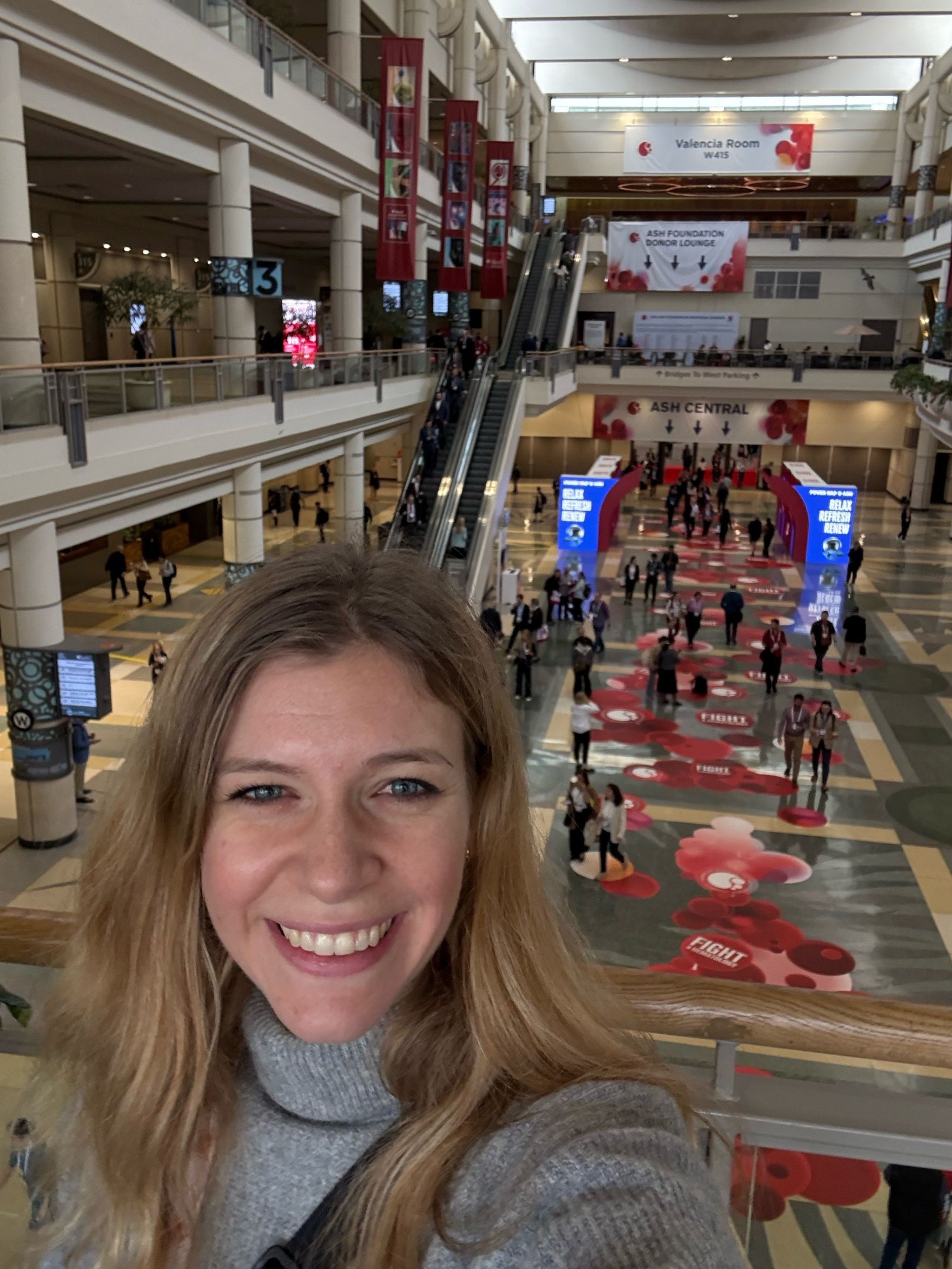
I am sincerely grateful for the DKTK Travel Grant, which supported my participation in the American Society of Hematology (ASH) Annual Meeting in Orlando in December 2025. During the conference, I had the opportunity to present my research as a scientific talk on an international stage- an important milestone in my career that has significantly enhanced my visibility within the hematology community and allowed to build valuable professional connections. In addition, I engaged with leading researchers and clinicians and learned about the latest advances in acute myeloid leukemia. The conference participation has further strengthened my development as both a physician and a researcher and I highly appreciate this opportunity supported by the DKTK School of Oncology.
Johanna Rausch, Frankfurt/Mainz
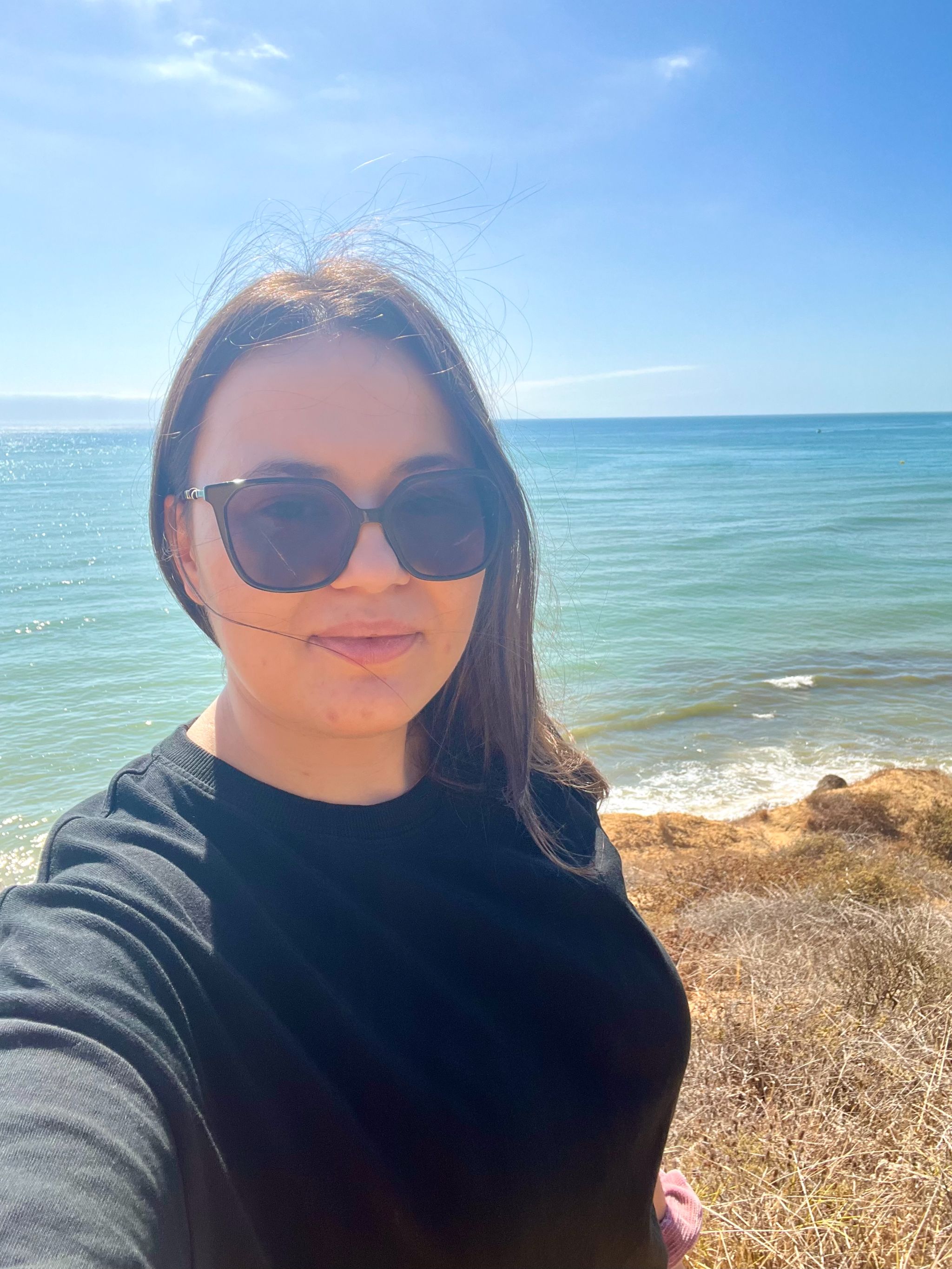
Attending the Summer School in Translational Oncology in Algarve, Portugal, supported by the travel grant from the DKTK School of Oncology, was an invaluable experience for my professional career growth. I got the opportunity to present my research as a poster and received constructive feedback and suggestions that will significantly contribute to improving my project. The event also provided an excellent platform to expand my professional network – I connected with scientists, PhD students and clinicians from Europe’s leading cancer institutions, such as Karolinska Institute (Sweden), NCI (the Netherlands), Gustave Roussy Institute (France), VHIO (Spain), Cambridge University and DKFZ (Germany). These interactions broadened my scientific network and inspired potential collaborations that will be highly beneficial for my current and future projects in translational cancer research.
Valeria Lozovanu, Dresden
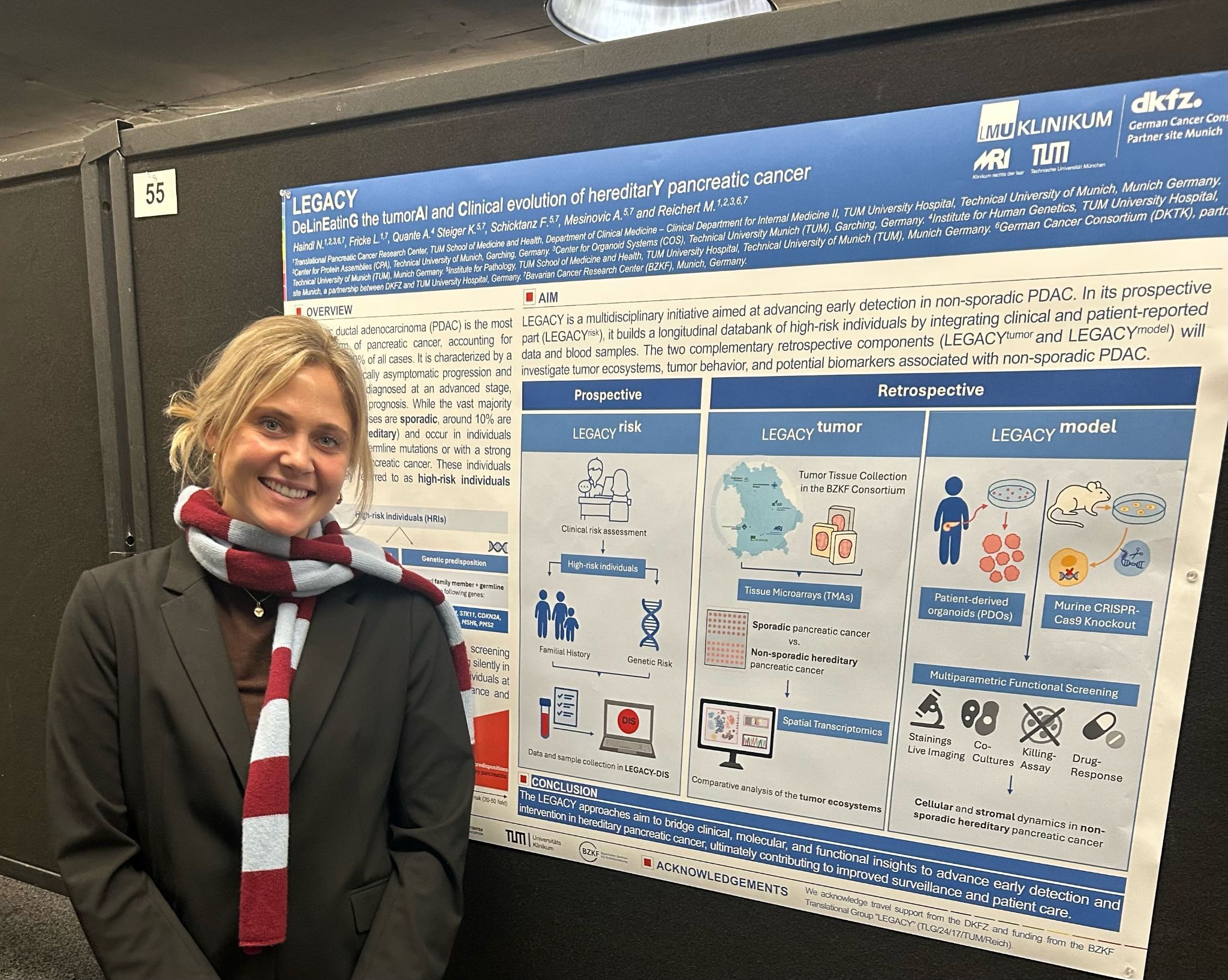
The conference in Portland, Oregon, which I was able to attend thanks to the DKTK Travel Grant, was a very special and exciting experience for me. Traveling to the United States all by myself and representing both my lab and the DKTK/DKFZ was far outside my comfort zone, but in a very positive way.
As a scientist, I believe it is essential to learn how to network, present research, and understand how labs in other countries approach similar challenges. At the conference, I learned how AI models that use electronic health records can identify people at higher risk of developing cancer and help guide more personalized prevention strategies. This was particularly relevant to my own PhD project, which focuses on individuals with a hereditary predisposition to pancreatic adenocarcinoma, the most common form of pancreatic cancer. Another session explored how early genetic mutations (such as BRCA1, BRCA2, and PALB2) can alter normal cells and eventually lead to breast cancer. These same genes are also important drivers in hereditary pancreatic cancer, making the findings especially interesting for my research. There were also discussions on how to make precision medicine more unbiased and accessible to all patients, as well as a debate on the benefits and potential drawbacks of early cancer detection. It was highlighted that screening can sometimes lead to overdiagnosis and unnecessary treatments, which may cause stress or side effects without improving overall survival. However, it was also emphasized that early detection remains one of the most effective approaches to identify cancer at a stage when it can still be treated successfully, just to name a few of the interesting things I learned at the conference.
Overall, there were many engaging sessions and debates, and presenting my poster was a great opportunity to share my project with researchers from around the world and meet collaborators from the ACED consortium. This whole experience has helped me grow both personally and professionally.
Nina Haindl , Munich
As a fellow of the DKTK School of Oncology, I recently had the opportunity to attend the Evolutionary Biology and Ecology of Cancer Course (EBECC) at the Welcome Genome Campus in Hinxton, near Cambridge, UK.
The School of Oncology enabled me to build a network with other fellows, one of whom recommended EBECC to me. I am particularly grateful that the DKTK School of Oncology supported my participation through a travel grant.
At EBECC, I was able to deepen my understanding of evolutionary concepts in cancer research, participate in live coding sessions and active discussions – and most importantly – meet amazing and inspiring people in the field. I wholeheartedly recommend the Evolutionary Biology and Ecology of Cancer Course and would especially like to emphasise the invaluable support I received from the DKTK School of Oncology. Thank you very much!
Julia Poller, Munich
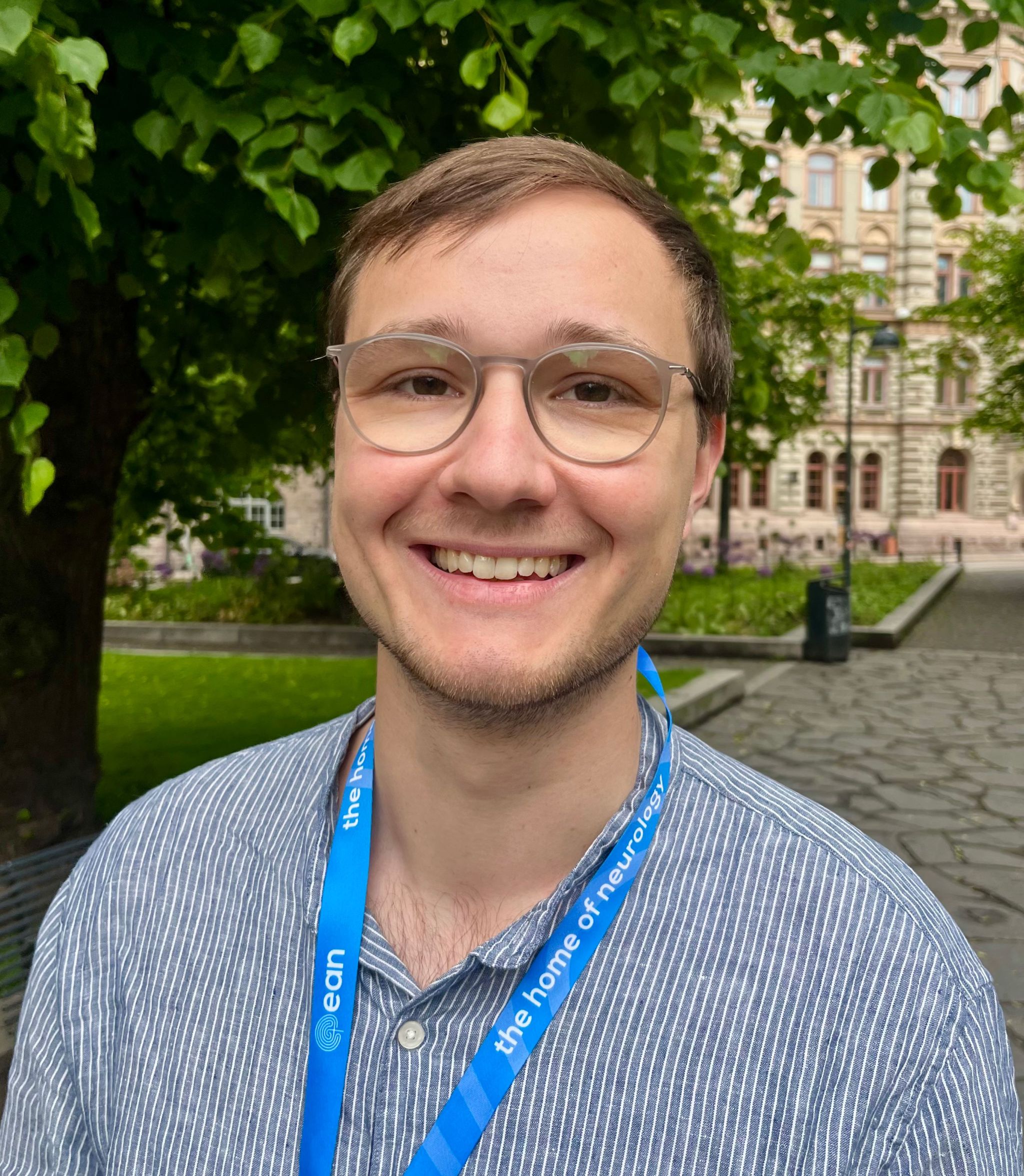
I am thankful to the School of Oncology for making it possible to attend the largest neurology conference in Europe through a travel grant. As a PhD candidate working in neuro-oncology research at DKTK Freiburg, it was a unique experience to attend EAN25 in Helsinki and give a presentation of our collaborative research on the effects of motor-cortical stroke in the dopaminergic midbrain using spatial transcriptomics. Coincidentally, the conference took place during Juhannus, the Finnish midsummer celebration, which made this stay even more memorable. I would like to thank our collaborators in the Department of Neurology at the Universitätsklinikum Freiburg for their ongoing support and fruitful discussions. I am humbled by the inspiring exchange with colleagues from around the world and grateful for the opportunity to learn so many new things.
Georg Kastner, Freiburg
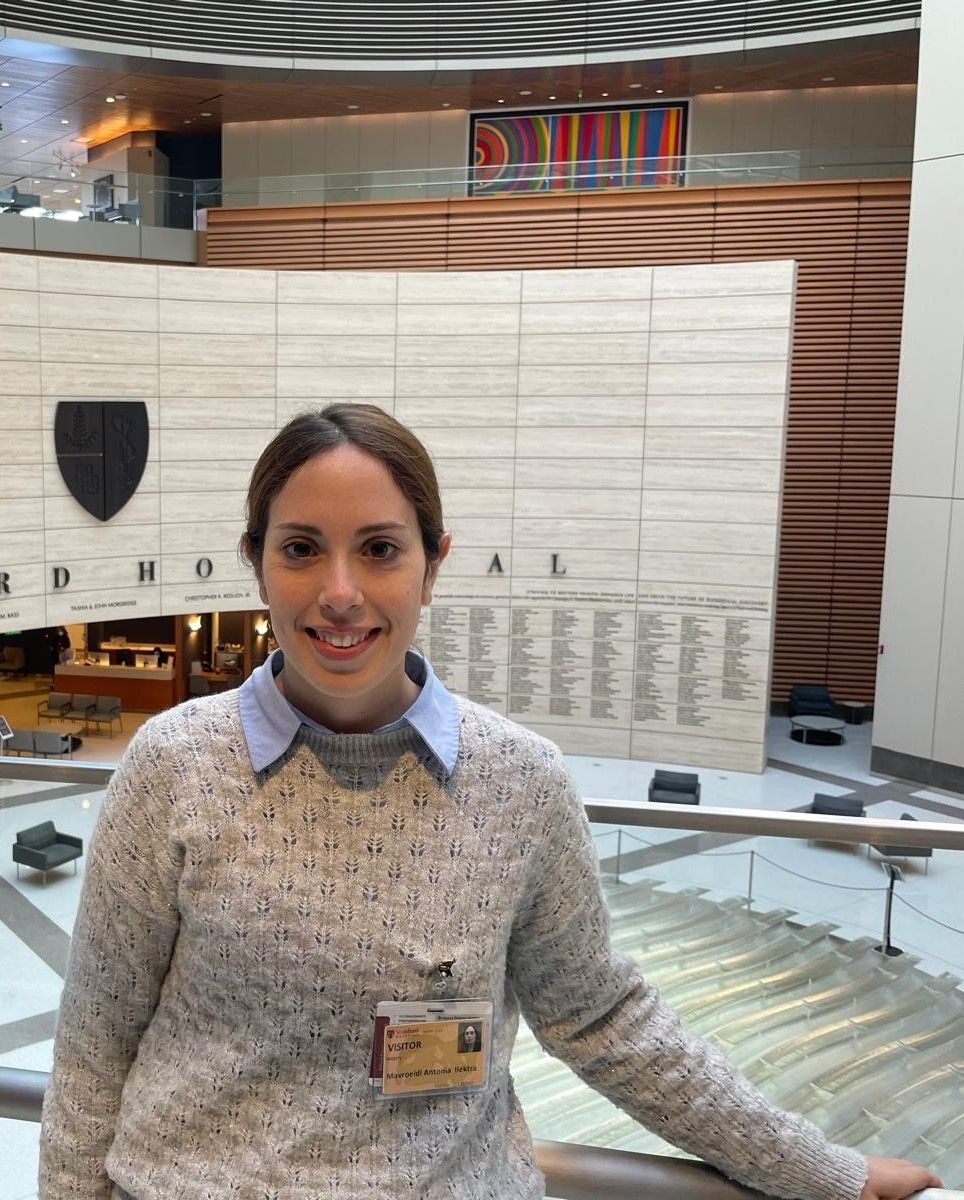
As a resident in oncology at the University Hospital Essen, Germany, I had the valuable opportunity to spend three weeks at the Stanford Cancer Center in California, supported by a DKFZ travel grant. The visit focused on both inpatient and outpatient clinical practice in gastrointestinal oncology, with a particular emphasis on hepatopancreatobiliary (HPB) malignancies—my clinical and scientific focus in Essen as well. During my time at Stanford, I was able to closely observe and participate in multidisciplinary care settings, including: outpatient clinics for gastrointestinal cancers, tumor board discussions with strong translational research integration, surgical case conferences and perioperative management of patients with HPB tumors at the intersection of surgical and medical oncology, exposure to advanced treatment strategies, including liver-directed therapies, immunotherapy in cholangiocarcinoma, and the integration of early-phase clinical trials.
My mentors included Prof. George Fisher and Dr. Lipika Goyal from medical oncology, and Dr. Poultsides from surgical oncology. We discussed several phase I clinical trials and treatment concepts in various gastrointestinal cancers.
Additionally, I had the opportunity to shadow Prof. Heather Wakelee in thoracic oncology and to visit the Department of Nuclear Medicine, where I became acquainted with the Theranostics Unit. This department administers targeted radionuclide therapies based on molecular markers—a field that closely aligns with my own scientific interest in bridging molecular oncology and nuclear medicine to support innovative cancer treatments. This experience provided deep insights into the structure and workflow of a leading comprehensive cancer center in the United States. It enabled me to compare diagnostic and therapeutic approaches with those used in Germany, observe patient communication models, and strengthen international academic ties that may lay the groundwork for future collaborations. It was fascinating to see how similar many of our clinical approaches are, while also noting Stanford’s more advanced systems for telemedicine and digital communication—both between clinicians and with patients.I am sincerely grateful to the DKFZ for making this enriching clinical and academic experience possible and for supporting the international development of young oncologists.
Ilektra Mavroedi, Essen
During the EACR Congress 2025, I presented a poster entitled “Unveiling Interactions Between
Senescent Tumor Cells and the Host Immune System – Implications for Senolytic Immunotherapy.” I received valuable feedback from experts in the cancer immunology field regarding potential directions for advancing the project, as well as opportunities for future collaborations. In addition, I attended several insightful talks spanning a broad range of cancer research, from basic science to clinical applications, which inspired new ideas for future projects. Lastly, I engaged with representatives from various biotech companies who introduced me to the latest technological advancements that could help enhance the outcomes of my experiments.
Bartolomeo Bosco, Berlin
Participating in the German Cancer Research Congress 2025 was a highly valuable experience for my professional development. Presenting my poster allowed me to receive constructive feedback from leading experts in the field and engage in insightful discussions on the application of ATR-IR spectroscopy in cancer diagnostics. The conference also provided a unique opportunity to connect with fellow researchers, explore potential collaborations, and stay up to date with the latest advancements in oncology. This experience has strengthened my motivation to pursue a career in translational cancer research and further develop innovative diagnostic approaches for pancreatic cancer.
Anne Wedemann, Dresden
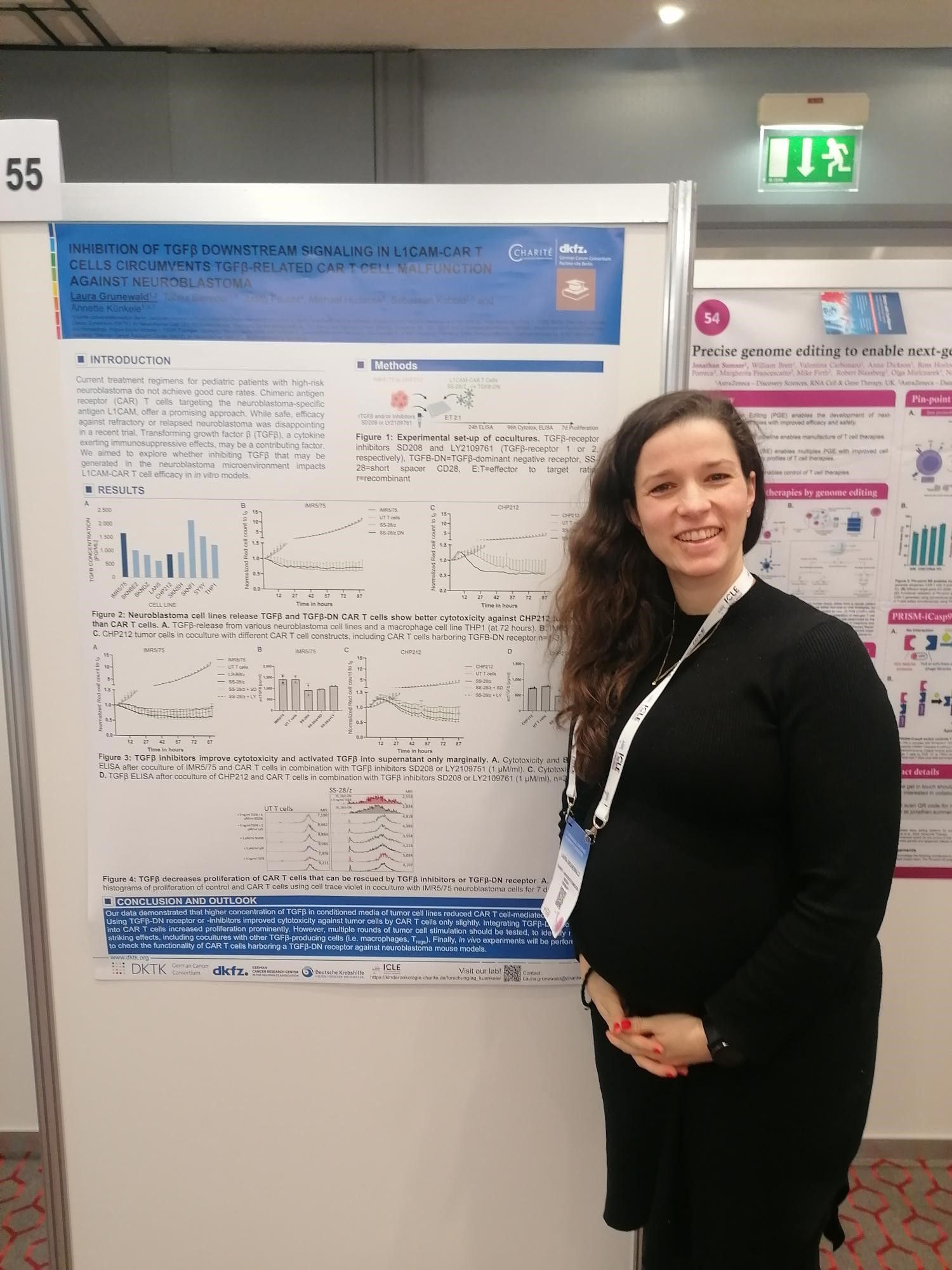
The ICLE meeting was a fantastic opportunity to gain access to the latest, mostly unpublished, data on T cell engineering. As someone primarily focused on tumor-related research, it was particularly valuable to attend a conference where the therapy we are actively developing and optimizing was center of attention. I had the chance to interact directly and network with researchers from around the globe, which allowed for insightful discussions about my project and those of my students and its current challenges. It was also exciting to see that innovative research in immunotherapy is expanding, not only for cancer treatment but also for other diseases, signaling a broader impact for this field. After two full days packed with talks, discussions, and networking, I left the conference feeling inspired to tackle the pitfalls in my own work with fresh perspectives and new ideas.
Laura Grunewald, Berlin
I am grateful to the DKTK School of Oncology for supporting my attendance at the 2025 ISMRM & ISMRT Annual Meeting & Exhibition in Hawaiʻi, USA, which is the largest conference dedicated to MR technology research and development. I had the pleasure of presenting two oral and three poster presentations, covering both our research at Goethe University Frankfurt and the work I contributed to during my DKTK research rotation at Johns Hopkins University. I was honored to be recognized with the W. S. Moore Young Investigator Award for original clinical research in magnetic resonance. This conference marked a significant milestone in my scientific and professional career.
Seyma Alcicek, Frankfurt
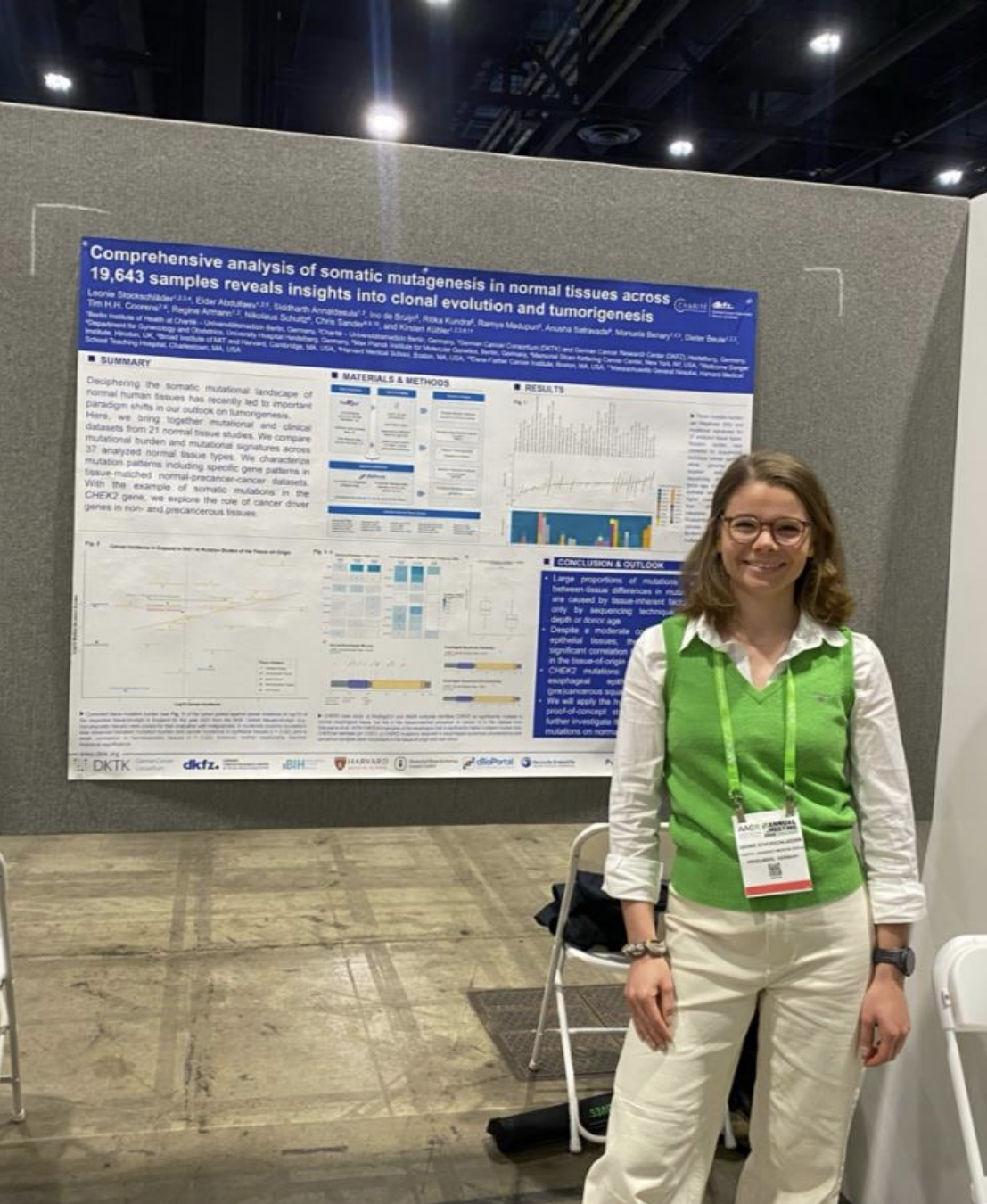
With the great financial support from the DKTK School of Oncology I was able to attend and present my current research at the AACR annual meeting 2025 in Chicago. With around 21,000 attendees this meeting is the world’s largest meeting for translational cancer research worldwide. The conference presented the great opportunity to learn about the latest breakthroughs in basic, translational and clinical research. Most striking presentations and topics included:
- from a clinical perspective: a phase 2 clinical study on a non-surgical approve for MSI tumors (esp. rectal cancer) only treated with 6 months of immunotherapy (Atezolizumab)
- from a translational perspective: distinct molecular and microenvironmental features of early-onset colorectal cancer in the time of exploding incedences
- from a basic science perspective: intra-tumor heterogeneity as well as the impact on extrachromosomal DNA on cancer development
Furthermore, the conference gave me the opportunity to reconnect with my transatlantic collaborators and discuss the latest findings, figures and manuscript of my current work. At my poster presentation I was able to get crucial in-person feedback on my current work from my collaborators as well as interested international colleagues in the field. This feedback is very important to now optimize the presentation of the results as well as get novel points-of-views on our results which will lead to new analyses that are added to e.g. the discussion of the current manuscript. All in all, I would like to thank the DKFZ, especially the DKTK School of Oncology for financially supporting my active participation at this years’ AACR annual meeting,
allowing me to learn about the latest advances in the field, broaden my network within the community and get present my current scientific project to the world’s largest cancer research conference.
Leonie Stockschläder, Berlin
With support from the DKTK School of Oncology Research Rotation Grant, MSNZ Research Fellowship, and FCI International Mentoring Trips, I completed a six-month research stay at the Russell H. Morgan Department of Radiology and Radiological Science at Johns Hopkins University School of Medicine. I was warmly welcomed by my mentor, Assistant Professor Georg Oeltzschner; Professor Richard Edden, head of the Neurometabolism section; Professor Peter Barker, director of the Magnetic Resonance Research Division; and their teams. During my stay, I was part of Assistant Professor Georg Oeltzschner's research group, focusing on advanced magnetic resonance spectroscopy techniques for brain tumor imaging at high and ultrahigh magnetic fields. Working with internationally renowned experts in magnetic resonance spectroscopy broadened my perspective in my research field, while also providing invaluable experience. I thank DKTK School of Oncology for the support that enabled this research stay.
Seyma Alcicek, Frankfurt
Attending the 2024 ASH conference in San Diego, supported by the DKTK School of Oncology, was an invaluable experience for my scientific career. Presenting my MD/PhD project on clonal hematopoiesis in CLL to a broad audience, including leading CLL experts, provided invaluable feedback that has helped shape ideas for further analyses in this and future projects. Additionally, the conference’s extensive program of translational and clinical talks offered valuable insights into cutting-edge developments in CLL research, broadening my perspective and deepening my understanding of the disease.
Benjamin Locher, Berlin
I had the honor to present our work on unifying T-cell acute lymphoblastic leukemia (T-ALL) immunophenotyping by a data-driven approach in a large adult T-ALL patient dataset in collaboration with the German Multicenter ALL study group (GMALL) at the 2024 American Society of Hematology annual meeting in San Diego. The data presented gained significant traction within the ALL community and we received encouraging feedback from potential expert reviewers and collaborators. Talking to scientists in ALL community discussing current trends and unpublished data was also tremendously helpful to shape our focus for upcoming single-cell proteo-genomics experiments in the DKTK IDENTI-T consortium.
Stefan Habringer, Berlin
Attending the ASH conference significantly contributed to my professional growth by exposing me to cutting-edge research in hematology and translational cancer research. I had the opportunity to present my work orally, and the presentation was well-received, allowing me to gain valuable feedback and enhance my presentation skills. I am sincerely grateful for the DKTK School of Oncology's support, which made it possible for me to participate in this important event and gain insights that will positively impact my ongoing and future research endeavors.
Nadezda Dolgikh, Mainz
I had the pleasure of attending the American Society of Hematology conference in San Diego from December 6-11, 2024. I was truly thankful for the opportunity and the support from the DKTK. As the largest conference in the hematology field, it allowed me to engage with leading experts and plan my career trajectory. It was also wonderful to finally meet many individuals I had only known as names in papers.
William Keay, München
I am grateful to the DKTK School of Oncology for the opportunity to attend the DZG Science & Career Day 2024. The event, Translational Medicine—From Lab to Life: Translating Research into Medical Innovations, was a powerful exploration of how scientific discoveries become real-world medical applications. But for me, it was truly "A Story of Resilience and Passion," which was particularly inspiring as a preclinical studies researcher. Listening to exceptional speakers share their journeys in translating medicinal products was eye-opening and deeply inspiring. Their dedication to overcoming challenges—from developing CAR-T cell therapy against neuroblastoma to pioneering the use of macrophages in treating Pulmonary Alveolar Proteinosis, a rare lung disease, and Stem Cell-based Replacement Therapy in Type-1 Diabetes—highlighted the perseverance and passion it takes to make a meaningful impact in medicine. The career workshop offered practical insights on networking, career development, and transitioning from research to entrepreneurship. Additionally, the event was an excellent opportunity to network and exchange ideas with many brilliant scientists.
Malgorzata Sulewska, Freiburg
I’m incredibly grateful to the DKTK School of Oncology for generously supporting my attendance at this year’s Society for Neuro-Oncology 29th Annual Meeting in Houston, Texas through their travel grant. This wonderful opportunity allowed me to be part of a truly thought-provoking and inspiring environment in the field of neurooncology, where experts shared groundbreaking advancements in areas such as cell-based therapies, cancer neuroscience, liquid biopsies, and more. The conference not only expanded my knowledge but also gave me the chance to present our latest findings, gain valuable feedback, and engage in meaningful discussions and conversations with potential future collaborators in the field. It was a truly inspiring experience that has further pushed my passion for advancing our own research in the field of immuno-oncology. I’m especially thankful for this incredible opportunity at the conclusion of my DKTK School of Oncology fellowship, making it possible for me to be part of such an inspiring event.
Celia Dobersalske, Essen/Düsseldorf
I am grateful for the opportunity to attend the 7th Congress of the European Society of Immunology, supported by DKTK. The Congress addressed global public health issues, such as cancer. The keynote lecture, brilliant talks, and poster presentations focused on the challenges of cancer immunodiagnostics and immunotherapy. I was able to share my knowledge with fellow researchers and clinicians, discuss the challenges of the work, and collaborate to find solutions with other experienced professionals. At the Congress, I gained exposure to cutting-edge research, novel methodologies, and emerging trends in cancer immunology, inspiring new research directions and innovative approaches in my work. Furthermore, I had the opportunity to establish new collaborations, fostering efficient work and scientific progress. Once again, I thank the DKTK community for supporting my work and that of other doctoral and postdoctoral researchers, thereby contributing to the future of cancer research!
Ekaterina Pylaeva, Essen/Düsseldorf
I am very thankful for the travel grant, which made it possible for me to attend the 2nd Annual Conference on Mass Spectrometry Imaging and Integrated Topics (IMSIS 2024) and gain invaluable experience. The conference highlighted the field’s latest advancements towards single-cell, multi-omic, and multimodal analysis, which aligns closely with my research on intrahepatic cholangiocarcinoma, a tumor that requires detailed spatial and morpho-molecular insights. The lively discussions during coffee breaks and at my poster session provided valuable insights that I can apply to both my current and future research. Additionally, the networking opportunities have opened new avenues for collaboration, which I am eager to explore.
Melanie Föll, Freiburg
The SoO Travel Grant allowed me to attend for the first time to ASH meeting, the biggest conference in the Hematology field, which took part in San Diego, USA, in December 2023. Attending to this conference gave me another dimension of the importance of our research and a lot of insights for my projects. It was also a great opportunity to meet other researchers, get feedback and possibilities for collaborations.
Vanessa Arfelli, München
The support from the DKTK School of Oncology and the MSNZ Frankfurt enables me to undertake a research stay in the laboratory of David Solit at MSKCC in New York. The conducted project extends my research efforts at the Department of Urology and the Institute of Pathology in Frankfurt, with the goal of understanding the heterogeneity of bladder cancer and identifying mechanisms of resistance to systemic therapies. My work is facilitated through complete integration into the scientific uropathological working group. The collaboration with the US fellows also allows for regular participation in Grand Rounds, urological lectures, and case discussions. Working alongside internationally renowned experts in the field of cancer research leads to both scientific and professional enrichment. The exchange is inspiring in diverse ways, and the environment provides new ideas and insights. The opportunity to temporarily reside in New York City permits experiencing the vibrant, open, and international metropolis.
Florestan Koll, Frankfurt
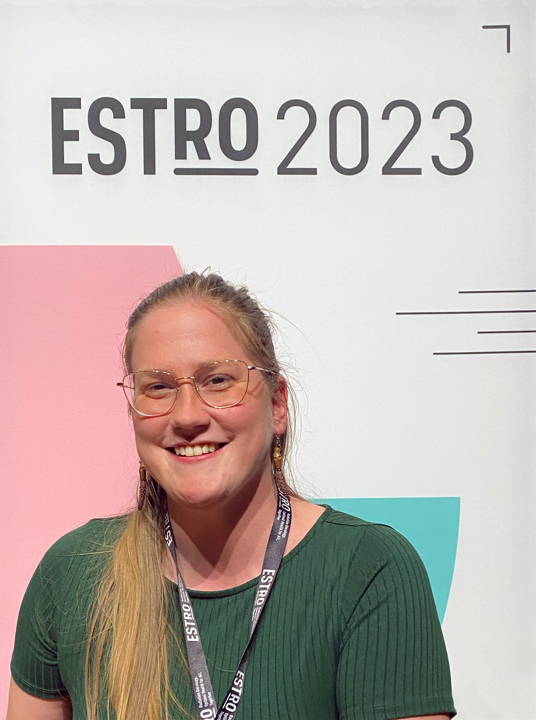
In May 2023, I attended the European Society for Radiotherapy and Oncology (ESTRO) congress in Vienna. ESTRO congress is the largest radio-oncology event in Europe, bringing together experts from both clinical and experimental science. As an experimental radiobiologist, attending excellent lectures from high-profile clinical scientists helped me put my own research into the context of real, present-day clinical application. Together with encouraging feedback on my own presentation, this gave me fresh enthusiasm and motivation for my upcoming scientific career. Furthermore, such a global event provided an excellent space for networking and establishing new contacts for potential future collaborations. I am grateful to the DKTK School of Oncology for generously sponsoring this trip.
Sona Michlikova, Dresden
I had the pleasure of attending the DZG Science & Career Day 2023 - Translational Health Research in Berlin, and it was a memorable experience. It was fascinating to meet scientists from all eight disciplines of translational research in Germany and engage in meaningful discussions. I particularly enjoyed the workshop sessions and talks on networking, establishing intrapreneurship in academia, and gaining insights from the ministry's perspective on promoting young scientists in translational research. Additionally, it was intriguing to explore the overarching principles and methodologies used in other disciplines' research, which could be applied to cancer translational research. I thank DKTK for their generous support, as it made this trip possible for me.
Essak Khan, Mainz
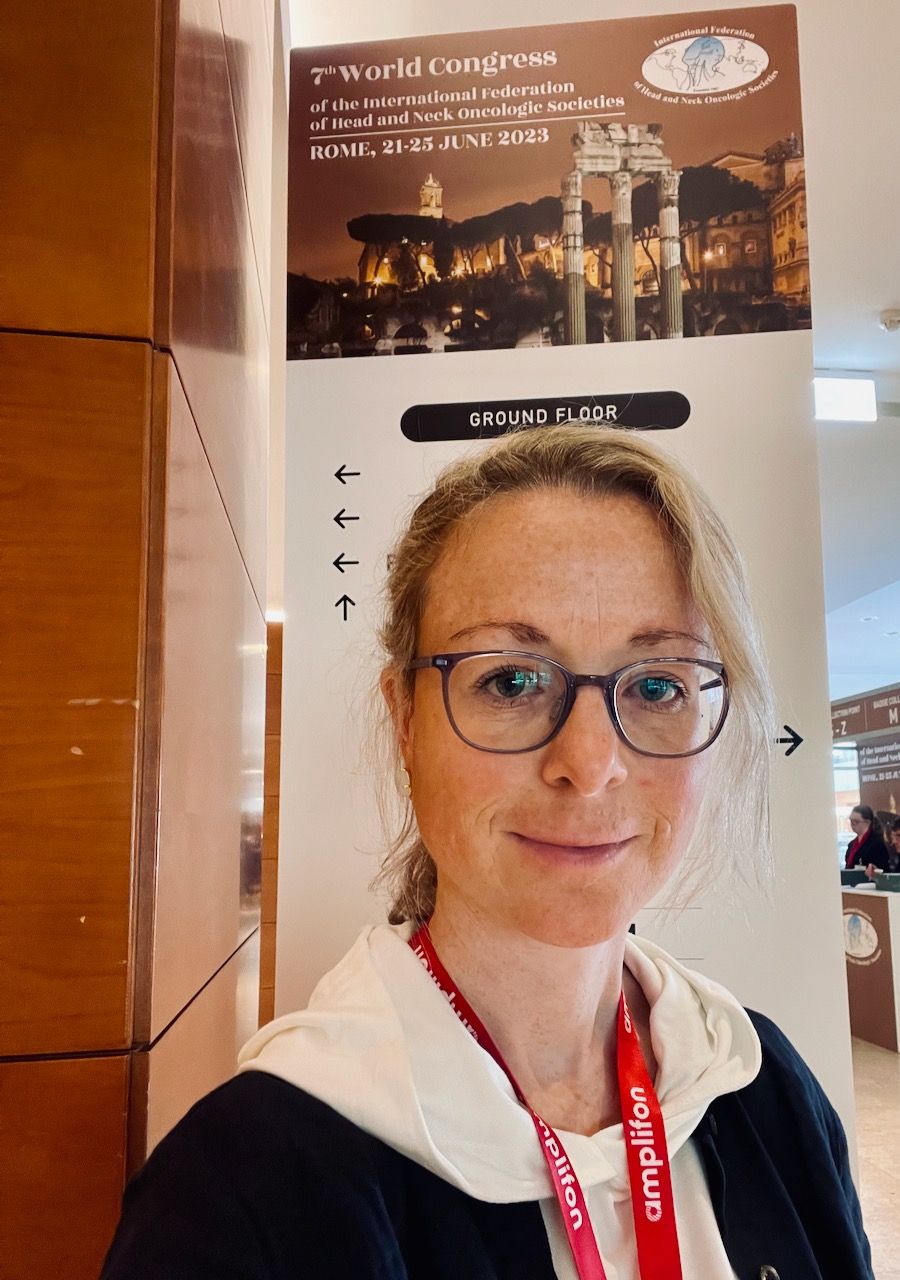
I have been able to attend the 7th World Congress of the International Federation of Head and Neck Oncologic Societies (IFHNOS) in Rome, Italy, and present my research in an oral presentation in the Basic Research Selected Free Papers Session to a global audience. My congress attendance was supported by the DKTK Travel Grant. The meeting included Keynote and dedicated lectures by renowned experts in the field of Head and Neck Oncology, panels, symposia and round table debates on surgical, medical oncology and radiation oncology topics as well as translational research aspects such as liquid biopsy. It offered a great opportunity to learn in a multidisciplinary setting about new developments for improvement of diagnosis, treatment and outcomes of patients with head and neck cancer.
Susanne Flach, München
After 4 years waiting time, we were finally able to participate in person at the Advances in Neuroblastoma Research Meeting in Amsterdam. It was a very great opportunity to get the newest, unpublished data on Neuroblastoma research. I was able to directly interact and network with researchers from all over the world to discuss my project and the pitfalls. It was also great to see, that more interesting research ideas on immunotherapy in Neuroblastoma have been topic at the conference. It was a long conference with 4 full days of talks, discussions and networking, but afterwards, I felt motivated to tackle the pitfalls in my own projects with fresh ideas.
Laura Grunewald, Berlin
During my 9 weeks stay in August/September 2022 at the University of Manchester, U.K., which was supported by the DKTK Research Rotation Grant, I was able to initiate a collaborative research project with Prof. Wedge’s group on studying clonal evolution in head and neck cancers using computational models. The aim of this collaborative project is to dissect the epithelial, immune, and stromal cellular ecosystem of normal mucosa as well as low- and high-grade dysplastic and malignant lesions in the upper aerodigestive tract that have been collected multi-regionally and to link them to their respective genomic and transcriptomic profiles using cross-omics integration. This will hopefully help us to better understand which individuals with premalignancies will progress and develop clinically significant cancers within their lifetimes as well as identifying ways to intercept the disease in future. December 2022
Susanne Flach, Munich
I presented a poster about my parts of my current bladder cancer research at the International Bladder Cancer Network meeting in Barcelona. With about 150 participants it is a rather small conference that allowed me to directly talk to the international experts involved in improving diagnostics and exploring novel therapeutic approached for bladder cancer. I was able to exchange research results and ideas, get new input and further advance my planned collaborative project in the United States. The meeting location was fabulous in the old Hospital de Sant Pau leading to a wonderful atmosphere in Barcelona. I thank the DKTK School of Oncology for supporting me with a travel grant. October 2022
Florestan Koll, Frankfurt/Mainz
The participation on the World Conference on Lung Cancer (WCLC) 2022 meeting in Vienna was a great experience for me. The plenary and educational sessions provided a complete overview of the current therapeutic options and latest research findings on lung cancer in different stages. Special sessions and discussion groups were devoted to rare thoracic malignancies including mesotheliomas that I have a special interest for. Sessions about lung cancer epidemiology or lectures of patient advocacy groups helped to further broaden my view on this disease. During the lunch breaks and the poster sessions there were plenty of opportunities for scientific exchange. There was a great interest in our findings and I received valuable feedback. I would like to thank the DKTK for supporting my participation in this conference with this travel grant. August 2022
Luca Hegedus, Essen
I feel blessed to have the unique opportunity of presenting my research at the Annual Meeting of the German Society of Radiation Oncology 2022 in Stuttgart. I have presented and discussed my latest findings on molecularly-guided precision radiotherapy in patients with meningioma as an oral presentation, and further on pleomorphic xanthoastrocytoma as poster presentation. The scientific exchange with my colleagues have inspired and motivated me to further promote the translation from molecular brain tumor classification to clinical patient care in radiooncology. I am grateful for the support by the DKTK School of Oncology and the Physician-Scientist program of the Medical Faculty Heidelberg, and further for the support of my mentors Prof. Dr. Dr. Jürgen Debus and PD Dr. Laila König. Mai 2022
Maximilian Deng, Heidelberg
Support from the DKTK School of Oncology enabled me to present our work on radiotherapy-induced Natural Killer cell responses to an international audience at the AACR Annual Meeting 2022. Our presentation received much attention and positive feedback from leaders in the fields of radiotherapy and Natural Killer cell based immunotherapies. I am convinced that this helped promote both our research as well as the DKTK internationally and we hope to collaborate with our new contacts in the future. April 2022
Thomas Walle, Heidelberg
The DKTK Research Rotation Grant has enabled me to develop data analysis pipelines for our high dimensional clinical immunomonitoring platform at NCT Heidelberg. This collaboration with our partners at the Memorial Sloan Kettering Cancer Center in New York, U.S.A will also help us to translate our understanding of cancer immunotherapies into benefit for patients in future projects. April 2020
Thomas Walle, Heidelberg
In the NaWik seminar „Science Communication“ in Karlsruhe, I learned that a good presentation is tailored to its audience. It conveys why the topic is interesting for the listeners – be it fellow scientists or school children. March 2020
Noemi Bender, Heidelberg
The research rotation at Weill Cornell Medical College in New York City in February/March 2020 enabled the initiation of a collaborative research project based on resources from both institutes. I had the chance to meet with experts in the fields of cancer epigenetics as well as metabolomics and got fully integrated in the research group. After cancelling my stay prematurely due to the Covid-19 spread, we continued the collaborative work via Skype calls and Zoom meetings and I hope to return to the lab in New York continuing my stay eventually.
Sebastian Vosberg, Munich
Due to the corona crisis, the 2020 edition of the BioBusiness Summer School was the first online edition of this course. The organizers and speakers adopted absolutely great to this situation to give the participants the best experience during this amazing week. It was a great opportunity to hear lectures about important aspects in the life science business like intellectual property rights, business development, regulatory affairs and finance models. The program was completed by helpful information about career options in life science industry as well as advice for career planning and job applications. I would highly recommend this Summer School to PhD students and Postdocs, especially those contemplating about a career switch from academia to industry.
Tamara Werner, Freiburg
The seminar series „Translating Science into Clinical Practice“ was well structured and lectured by a very dynamic panel of experts. It was a fantastic opportunity to be primed in this topic. The concepts learned and the introduction to a network of experts in the field encouraged me to pursue the translation of my science into clinical practice.
Bruno Cadilha, Munich
The workshop Translating Science into Clinical Practice gave me valuable practical advices on the long path from having a good business idea to the actual product. For my further career I am more aware of the process it takes to bring science on the market and I have obtained many tools one needs to know to start a business in the translational field. Thanks for the good organization and the great real-life examples from the speakers.
Johannes Hildebrand, Munich
Thanks to DKTK School of Oncology Travel Grant I attended ESTRO 2021 conference - the biggest multidisciplinary event combining the biological and clinical knowledge from the field of radiotherapy. Within my PhD thesis, I am focused on the application of circulating tumor cells exhibiting stemness and radioresistant properties as a biomarker for metastatic prostate cancer patients' prognosis undergoing radiotherapy. As a biologist, it is often a challenge to understand the true clinical need. Therefore I found particularly valuable clinical sessions which this year strongly stressed a phenomenon of oligometastatic patients undergoing metastases-directed radiotherapy. Upon joining multiple clinical and biological talks, as well as poster sessions, I realized how underinvestigated are currently ongoing studies involving liquid biopsies in combination with radiotherapy which brought a fresh motivation into the project I am currently involved in. Moreover, onsite attendance was a great opportunity to improve networking skills in the multidisciplinary environment while exchanging experience with other young scientists.
Daria Klusa, Dresden